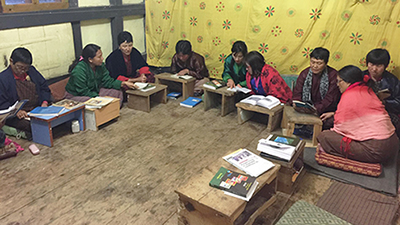 The education ministry targets to achieve 75 per cent adult literacy rate by 2023. The education minister shared this during the International Literacy Day early this month. At present, the adult literacy rate stands at 66.6 per cent.
The education ministry targets to achieve 75 per cent adult literacy rate by 2023. The education minister shared this during the International Literacy Day early this month. At present, the adult literacy rate stands at 66.6 per cent.
The adult literacy rate is the percentage of people aged 15 and above who can both read and write.
Lyonpo also said that non-formal education (NFE) has played a vital role in increasing the literacy rate and therefore the community learning centres will also be increased to 30 by 2023.
 “To enhance the opportunity for NFE graduates, the ministry is currently working on NFE equivalency framework. One of the main objectives is to establish a flexible learning pathway and linkages among formal, non-formal and vocational education,” the Education Minister Jai Bir Rai said.
“To enhance the opportunity for NFE graduates, the ministry is currently working on NFE equivalency framework. One of the main objectives is to establish a flexible learning pathway and linkages among formal, non-formal and vocational education,” the Education Minister Jai Bir Rai said.
“The programme has benefitted the lives of the marginalised people by reaching the unreached through Basic Literacy Course and Post Literacy Course. The programmes are offered to those above the age of 15 and those who could not pursue formal education. More than making them literate, it also gives them life skills and values that are eminent in our lives,” Tenzin Rabgyel, the Officiating Chief Programme Officer of Non-Formal and Continuing Education Division, said.
The programme has also encouraged and empowered many to contribute to nation-building by participating in local government elections.
According to the officials, a decrease in the number of NFE centres indicates increasing literacy rate among adults.
“The centres increased to over 900 at a time because then, the literacy rate was very low. In recent years, the number has dropped and this indicates that the programme has reached out to many people,” Tenzin Rabgyel added.
He added NFE dropouts are not much of a concern as the number is not very high. He said those leaving the education are due to personal issues and could continue the next year.
According to the Annual Education Statistics 2018, there are 560 NFE centres with over 6,000 learners.
The NFE in the country has been a success story which has transformed the lives of more than 200,000 learners since its inception. NFE was introduced in 1990 by the National Women Association of Bhutan as per the Royal Command.
Kinley Dem




